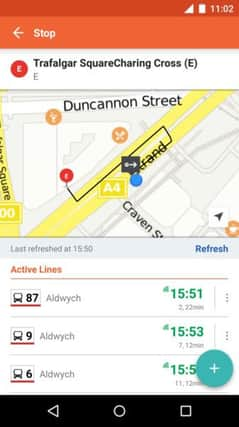The app that will always keep you one step ahead of the buses and trains


Without much demonstrable understanding of mobile technology - or indeed mobile vehicles - from the transit companies or public Metro services, it has fallen to tech companies to pick up the slack.
There have been many stabs before at apps which harness the real-time data bus and train companies are compelled to make available, but the tendency has been to charge you for delivering it in a useable format.
Advertisement
Hide AdAdvertisement
Hide AdOnce in a while, though, a service comes along which re-writes the rules. Waze, a sat-nav system for drivers which took data from its own users and shared the information around, was just such an app, becoming so successful that Google paid $1bn for it. Now, Moovit is starting to do the same for public transport.
You wouldn’t have thought that an app which covers 58 countries and countless transit systems would be able to quickly and clearly tell you whether the 10.29 to Harrogate is running to time, and which bus you need to catch to the station - but Moovit does that and more with aplomb. And unlike nearly every rival app, it’s free to download and use, with no annoying adverts or paid upgrade options.
You can install Moovit on Android, Apple and even Windows phones, and it works on tablets, too, albeit without a dedicated display mode. It uses your device’s GPS to pinpoint your location, and lets you load in your regular journeys, stations and bus stops. It then uses information from published timetables, real-time websites and its own users to tell you how long you can expect to wait.
Once you’re aboard a service, the app will track its movement, again via your phone’s GPS, and relay the information to other users. You can opt out of this if you think it’s invading your privacy: either way, it involves no extra effort on your part.
Advertisement
Hide AdAdvertisement
Hide AdThe money thrown at Moovit, from international investors such as BMW and Nokia, dwarfs that spent on public transport itself, and throws into stark contrast the third-world system we still tolerate in Yorkshire - some of whose operators, meanwhile, have rolled out apps of their own.
National Rail Enquiries, for years a byword for incompetence and incomprehension, has a free app of limited usefulness but requires you to pay nearly £5 to remove the adverts. Arriva and First Bus offer free apps but the best the West and South Yorkshire transport authorities can offer is a list of apps by other people.
For travelling further afield, the choice widens, but one app not to be without when you’re booking flights is Skyscanner, a service that compares prices from hundreds of airlines and shows you in bar chart format which dates are cheapest. It’s the sort of tool you used to find only in travel agents, on a screen they would turn away from you until they’d found something they wanted to sell you. Now it and Moovit are standard-bearers for democratising travel information. Not before time.